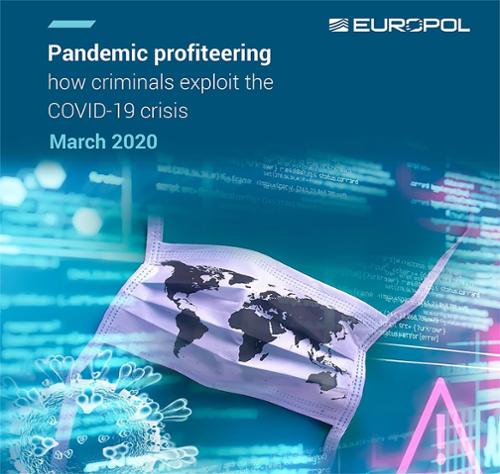How criminals profit from the COVID-19 pandemic

During this unprecedented crisis, governments across Europe are intensifying their efforts to combat the global spread of the coronavirus by enacting various measures to support public health systems, safeguard the economy and to ensure public order and safety.
A number of these measures have a significant impact on the serious and organised crime landscape. Criminals have been quick to seize opportunities to exploit the crisis by adapting their modi operandi or engaging in new criminal activities. Factors that prompt changes in crime and terrorism include:
- High demand for certain goods, protective gear and pharmaceutical products;
- Decreased mobility and flow of people across and into the EU;
- Citizens remain at home and are increasingly teleworking, relying on digital solutions;
- Limitations to public life will make some criminal activities less visible and displace them to home or online settings;
- Increased anxiety and fear that may create vulnerability to exploitation;
- Decreased supply of certain illicit goods in the EU.
Building upon information provided by EU Member States and in-house expertise, Europol has published today a situational report analysing the current developments which fall into four main crime areas:
CYBERCRIME
The number of cyberattacks against organisations and individuals is significant and is expected to increase. Criminals have used the COVID-19 crisis to carry out social engineering attacks themed around the pandemic to distribute various malware packages.
Cybercriminals are also likely to seek to exploit an increasing number of attack vectors as a greater number of employers institute telework and allow connections to their organisations’ systems.
Example: The Czech Republic reported a cyberattack on Brno University Hospital which forced the hospital to shut down its entire IT network, postpone urgent surgical interventions and re-route new acute patients to a nearby hospital.
FRAUD
Fraudsters have been very quick to adapt well-known fraud schemes to capitalise on the anxieties and fears of victims throughout the crisis. These include various types of adapted versions of telephone fraud schemes, supply scams and decontamination scams. A large number of new or adapted fraud schemes can be expected to emerge over the coming weeks are fraudsters will attempt to capitalise further on the anxieties of people across Europe.
Example: An investigation supported by Europol focuses on the transfer of €6.6 million by a company to a company in Singapore in order to purchase alcohol gels and FFP3/2 masks. The goods were never received.
COUNTERFEIT AND SUBSTANDARD GOODS
The sale of counterfeit healthcare and sanitary products as well as personal protective equipment and counterfeit pharmaceutical products has increased manifold since the outbreak of the crisis. There is a risk that counterfeiters will use shortages in the supply of some goods to increasingly provide counterfeit alternatives both on- and offline.
Example: Between 3-10 March 2020, over 34 000 counterfeit surgical masks were seized by law enforcement authorities worldwide as part of Operation PANGEA supported by Europol.
ORGANISED PROPERTY CRIME
Various types of schemes involving thefts \have been adapted by criminals to exploit the current situation. This includes the well-known scams involving the impersonation of representatives of public authorities. Commercial premises and medical facilities are expected to be increasingly targeted for organised burglaries.
Despite the introduction of further quarantine measures throughout Europe, the crime threat remains dynamic and new or adapted types of criminal activities will continue to emerge during the crisis and in its aftermath.
Example: Multiple EU Member States have reported on a similar modus operandi for theft. The perpetrators gain access to private homes by impersonating medical staff providing information material or hygiene products or conducting a "Corona test".
Europol’s Executive Director Catherine De Bolle: While many people are committed to fighting this crisis and helping victims, there are also criminals who have been quick to seize the opportunities to exploit the crisis. This is unacceptable: such criminal activities during a public health crisis are particularly threatening and can carry real risks to human lives. That is why it is relevant more than ever to reinforce the fight against crime. Europol and its law enforcement partners are working closely together to ensure the health and safety of all citizens
European Commissioner for Home Affairs Ylva Johansson: I welcome this new Europol report on latest developments of COVID-19 on the criminal landscape in the EU. The EU and Member States are stepping up efforts to keep people safe: National authorities and EU Agencies like Europol and ENISA are providing valuable input into how we can tackle this challenge together. I am determined to ensure that the Commission does all in its power to support law enforcement in the face of this new threat

 Greek
Greek





